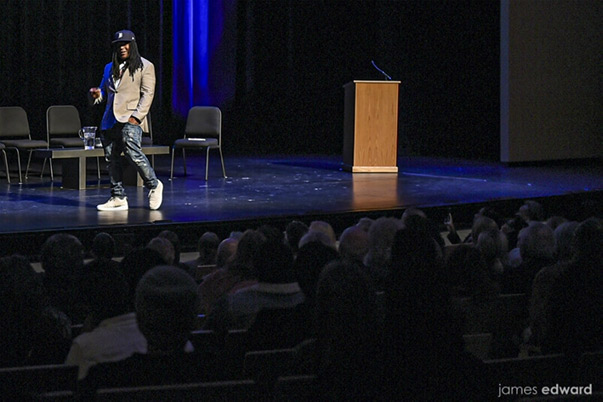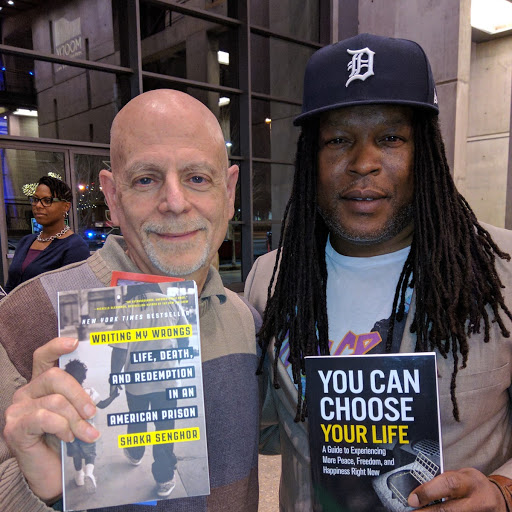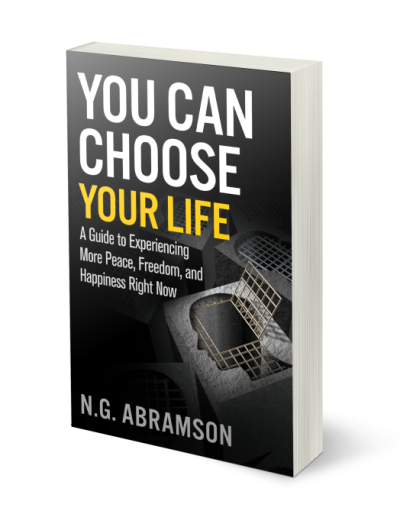I went to hear Shaka Senghor speak on Martin Luther King Day in Dallas, Texas. It was an event put on by the Dallas Institute of Humanities and Culture.
 For those of you who don’t know Shaka Senghor, he is an ex-felon who spent nineteen years in prison, seven of those in solitary confinement.
For those of you who don’t know Shaka Senghor, he is an ex-felon who spent nineteen years in prison, seven of those in solitary confinement.
I was excited to him hear him speak not only because he published a book in 2016—Writing My Wrongs: Life Death and Redemption in an American Prison—that became a New York Times bestseller and not only because Oprah Winfrey interviewed him for her SuperSoul Sunday television show. But because in addition to these things, he turned his life around and was now speaking on prison reform—a subject very dear to my heart, having spent some time in prison myself as a teenager.
How did we end up in prison?
I imagine Shaka has a different answer to this question than I do. But based on the information in his book and having listened to him speak, it is fair to say that the environment where we grew up certainly played a part.
Both Shaka and I got in with the “wrong crowd.” And because we were influenced by the people around us, we did things that they did, which meant that we broke the law. Of course, our attitude had a lot to do with us ending up in prison. We were both angry young men. Shaka was involved with a more dangerous crowd than I was, but any group of people that participates in breaking the law is a dangerous one. And we both hung out with people who did that.
The challenge of changing one’s mindset
Having been a young drug dealer and then having gone to prison for nineteen years must have made it very hard for Shaka to change his mindset. If you read his book, it will be apparent how much his environment affected his life. In his book, he writes, “The ‘hood was at war with itself, turning it’s anger inward like a bloodthirsty cannibal.” He lived in an environment where he knew “it was only a matter of time before [he’d] have to kill or be killed.” That he changed his mindset speaks volumes, especially since he started the process while in prison.
I know from personal experience that having guards shouting at you and throwing your personal belongings all over the place as they search for contraband does not make it easy to change one’s mindset, especially if you’re changing it to become a more understanding and compassionate person.
We all know that it takes a lot to change one’s mindset even if you’ve never spent a day in prison in your life. But it probably takes more if you have.
The Facts
Of course, being in prison carries a special burden. It takes a mental and emotional toil on one’s life. And once out, no one is completely welcomed back into society. The truth is that most people who come out of prison don’t stay out. A U.S. Sentencing Commission report on recidivism released in January 2020 found that “64% of federal prisoners who had been convicted of violent offenses were [re] arrested within eight years compared with about 40% of those convicted of nonviolent offenses.”
Both of these percentages are high. But 64% is really high. And Shaka was imprisoned for a violent offense, which makes his not returning to prison even more amazing. (He’s been out ten years at the time of this writing.)
We decided to never go back
Shaka and I are part of a small group of individuals who decided that we were not going back and didn’t. That means we had to work on ourselves–on our attitude and on the way we experienced our lives, others, and the world around us. For us not to go back, we needed to stop being angry and stop reacting to our situation in ways that were counterproductive, and that’s what we did. We stopped. We made sure we didn’t get ourselves into situations where we might say or do something that would have us return. We began work on changing the person we were when we were arrested.
We chose to work on improving our lives
 Shaka and I, in different states and at different times, did something that some–but not enough–people have done and continue to do. That is we worked on improving our lives from the inside out. All that means is that we began looking internally, instead of externally. We began to consider how our own mindset helped get us into prison in the first place, so we could change it to make sure we’d never go back again.
Shaka and I, in different states and at different times, did something that some–but not enough–people have done and continue to do. That is we worked on improving our lives from the inside out. All that means is that we began looking internally, instead of externally. We began to consider how our own mindset helped get us into prison in the first place, so we could change it to make sure we’d never go back again.
From hearing Shaka speak and from reading his book, it is clear that he worked on himself, so he could live a life he could be proud of. It is also not surprising that he wrote a New York Times bestselling book, has been helping at-risk youths, and has become a powerful spokesperson for prison reform since he’s been out.
I too turned my life around. Once out, I went straight to college. And over the course of seven years, I received three degrees, volunteered at ex-offender agencies, and also wrote a book. Mine is titled You Can Choose Your Life: A Guide to Experiencing More Peace, Freedom, and Happiness Right Now.
Both Shaka and I changed the direction our lives were heading. We set a different course for ourselves than the one our surroundings contributed in setting for us. We left our old mindset behind and began preparing for a life of possibility and freedom.
The work is never over – for us or for you
In spite of all the work Shaka and I individually did to turn our lives around, it’s not over. It will probably never be, because as long as life continues to give us new challenges, there’s going to be new opportunities to grow and learn from those challenges. I can tell you from my own experience those challenges don’t seem to stop. And I am faced with the choice to grow and develop from them or stay where I’m at. I try to choose the former. From meeting Shaka and listening to his talk, it is clear that he does too.
In fact, we all have this choice–to learn and grow from our challenges or not.
It’s Always a Choice
Both Shaka and I used our time (and continue to) to figure out what we could do to improve our lives. But we didn’t have to. We chose to use our time in that way. In fact, no one has to work on improving their life. It’s always a choice.
If you’re interested in looking at this choice for yourself, here are some questions you may want to answer:
* Are you where you want to be in life right now?
* If you’re not, where would you like to be?
* How might you be in your own way from being where you’d like to be?
* And lastly, what are some of the things you can do to get out of your own way?
We can all make working on improving our lives from the inside out a choice and a priority. Of course, we don’t have to be, but we can. We can work on becoming more fulfilled, understanding, and happier. All of us can do that. Granted, the work required to improve our lives may not always be pleasant because it will require looking at where we’re stopped in our lives and then taking responsibility for being stopped in those areas. But if we don’t deal with where we’re stopped and try to understand our part in being stopped, it’s going to be hard to keep moving our lives forward.
It’s so worth it to improve our lives. Shaka and I can both tell you that from our personal experience. We know what it takes to turn one’s life around. And we know that it’s possible for anyone to do it as long as they’re willing to do the work. Shaka will be the first person to tell you that everyone’s life is redeemable, no matter what has happened in their past.
 Are you in a mental prison?
Are you in a mental prison?
A lot of people may have never been in a physical prison, but that doesn’t mean that they’re not in their own mental prison. As I see it, anyone who is stuck in any area of their life is in a mental prison.
The good news is that there are no mental prisons we can’t get out of. However, to get out, we first have to recognize we’re in them. Only this way will we know the kind of work we have to do to get out.
Getting back to Shaka’s talk
Shaka is living proof that we all can change our lives, no matter what has happened in our past. He’s now doing all he can to make sure at-risk youths know they have other choices and those released from prison are welcomed home, not as broken people, but as contributing members of society.
It was very inspiring to hear him speak. Just from listening to Shaka, I got clear about what’s possible for all human beings who are willing to work on themselves and not let their past or any labels define them. It was clear to me that Shaka had totally recreated himself. His example is undeniable proof that everyone of us can.

The next step
What’s the next step for you? It’s an important question you may want to ponder. Perhaps if you read Shaka or my book, it may lead you a little more quickly to your answer.
If you’d like to read my story about how I ended up in prison and turned my life around, I encourage you to get my book, You Can Choose Your Life: A Guide to Experiencing More Peace, Freedom, and Happiness Right Now.
You can get it by signing up on my book page, which will have an offer of two free gifts and will direct you to make your purchase through Amazon.
I appreciate any comments you have about this blog post. Thanks in advance for taking time to share your thoughts.

It’s a powerful story. I can’t imagine being in solitary confinement that long. But it’s a testament to the fact that almost anyone can change and turn their life around. Inspiring!
Hi Neal, I very much enjoyed reading your article concerning Shaka and your similar experiences and your missions. It was beautifully written. I particularly liked the flow of your thoughts and your words in the piece. Well done, brother! Keep ’em coming. Good health, be safe. Love you, Bob
Very inspiring story about overcoming tragedies and ex offender status to live with hope and inspire others to do so. Greatly needed and greatly appreciated.